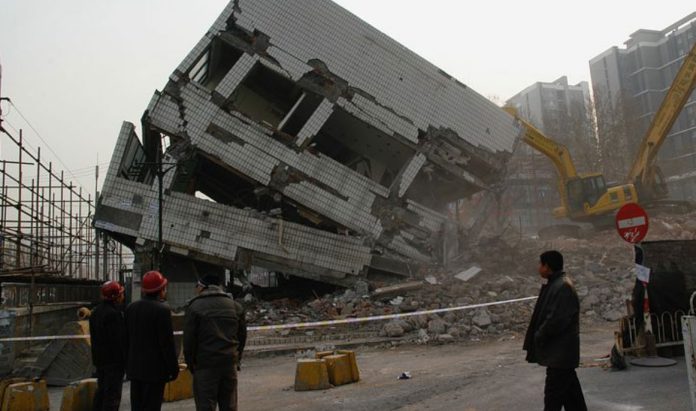If you need to renovate your home, you might need to demolish some structures to replace them with better ones. You will have to start by estimating what you need for the house demolition, calculating the costs, and finding the right demolition company.
However, a demolition project goes beyond choosing the demolition company. You can hire contractors to demolish a house if you need to remove an old structure. But sometimes, you need to know other things to consider when planning your demolition project.
We have analysed the house demolition costs for 2022. We have also suggested factors to consider during a demolition project and the relevant demolition permit to acquire before starting a house demolition.
Comparing Quotes Could Save You Upto 33%:
How Much Does Demolition Cost?
Demolition costs are not uniform across the UK. Demolition contractors can charge between £80 to £110 per square metre. Generally, demolition costs for a small detached house can be up to £7,000. More extensive house demolition can require as much as £20,000 if you want to demolish the entire house.
We have summarised the average demolition cost for 2022 in the table:
| Approximate Area (m2) | House Size | Average Demolition Cost |
| 80 | Small House | £5,000 |
| 150 | £9,500 | |
| 200 | Large House | £12,000 |
| 250 | £28,000 |
The summary above covers demolition costs for an entire house. However, you can choose to demolish only a part of your house – chimney demolition, roof demolition, garage, kitchen, or even a kitchen cabinet. In this case, your demolition cost will be much lower. The smaller the project, the cheaper the cost. Hence, a chimney demolition cost will be lower compared to a basement demolition cost. With the right demolition companies, you can get the best deal. You can find the right deal for you and get quotes on Bark.com. Below, we discuss the average cost for these smaller demolition projects to aid your planning.
Comparing Quotes Could Save You Upto 33%:
1. Garage Demolition Costs
If space runs out at home and you need a bigger garage, you cannot always go on to buy a new home. You may have problems with an old garage, ranging from damaged interior walls to insufficient space.
Thus, renovating your existing garage and adding to it is best. While an entirely new structure probably may not fit into your current space, you could tear down what is already there, dig out any remaining walls, replace the roof, and add in whatever improvements you have always wanted.
The average single-story garage can cost you up to £2,000. A garage for two cars costs about £3,000 while a three-car garage is around £4,000. These costs depend on various factors:
- The material of the existing garage: Concrete garages are usually built using precast slabs or poured-in-place concrete walls. Hence, concrete garages are the easiest type of garage to demolish, although they require a lot of labour and time to construct. Brick garages, on the other hand, will cost more to destroy because they need more work.
- The size of the garage: The garage size also determines the cost. Two-car garages usually cost 1.5x the price of single-car garages. A three-car garage requires 2x the amount for a single-car garage.
- The foundation of the garage: If you have a garage with a concrete foundation and a slab base, you will pay more demolition costs compared to an exposed or gravel base.
Other factors that can affect your garage demolition cost include the cost of debris disposal and rent for the right tools.
2. Bathroom Demolition Costs
Sometimes, you may need to replace the flooring, walls, and windows. If you have some space to spare, you can also choose to expand your bathroom. If you are lucky, you may be able to renovate an old toilet.
A typical bathroom will cost approximately £500 to $2,500 to demolish. But the actual cost also depends on several factors:
- Reusing the fixtures: If you plan to reuse some of the fixtures in your toilet, you may require the service of an experienced professional. Such professionals usually need higher fees to salvage your stuff. On the bright side, however, you will not have to pay extra to buy new washing-hand basins or replace many pipes.
- Disposing of waste items: Debris removal services and broken fixings can also increase your demolition cost. You will have to pay for the extra labour and the skip hire.
3. Kitchen Demolition Costs
It is best to leave kitchen demolition to those experts that know what they are doing. The professionals who have been demolishing kitchens for years understand the intricacies of kitchen design. Hence, they can safely remove everything. Keeping track of valuable materials, like plumbing pipes, gas lines, and electrical wiring, can ensure you get the best demolishing service. But it will not be cheap.
The kitchen demolition costs for 2022 can reach around £2,500. The demolition cost depends on the kitchen area, cabinets, the stuff you want to reuse, sinks and drains. The estimations for different demolition parts are usually as follows:
- Kitchen cabinets – £50 to £300
- Appliances – £50 to £250
- Worktop – £50 to £150
- Flooring – £50 to £250
- Sink – £50 to £80
Comparing Quotes Could Save You Upto 33%:
Demolition Quote Factors
It is not surprising to find people wondering how demolition costs can get as much as they do. After all, most people could do it themselves. But it takes trained experts and experienced professionals to do a wall demolition right. Then there are other factors to consider, like disposal and protection of reusable items. You may be wondering how the demolition companies calculate their quotes. Below are some factors they consider when calculating your demolition cost:
1. Size of the project
Building structures take various amounts of time and labour to demolish, hence the costs. Demolishing an old building might require less effort if you want to knock down something fast. However, bigger and stronger structures require more effort and cost more money. A small house costs less than a larger building. Also, if you need to demolish a wall instead of a roof, you could cut your expenses by hundreds of pounds.
2. Type of materials
Most demolition companies will charge you extra for waste disposal, depending on the materials. When they see that your skip contains mixed loads, like concrete, bricks, wood, glass, etc., they could charge higher fees. It is because different loads require different collection processes. Some loads even require recycling. Others may need to go to landfills. To avoid paying more, you could ask to know what kind of skip and load combinations will cost less at the time of booking. Moreover, you could try to keep the load mix low, which should help your costs decrease.
3. Demolition type
The demolition type affects the cost of your house demolition too. There are three major types of demolition:
- Top-down Demolition: This demolition type often involves mechanical demolition. It is best for high-rise buildings, and the experts have to demolish each storey separately. Wrecking machines make the work more manageable but can be very expensive. Further, the mixture of materials in the debris makes waste removal cost more.
- Hand Demolition: Unlike mechanical demolition, hand demolition is not quick and easy. But it is the safest method if you want to maintain some of the structure. Moreover, the workers can separate different materials and salvage the ones for recycling.
- Explosive Demolition: This method is commonly used during urban renewal projects. An example would be removing an old office tower inside another skyscraper. Explosive charges at various points around the perimeter of the building cause the structure to implode inward.
4. Access
The experts must gain access to the structure to conduct a successful demolition. If the demolition requires heavy equipment such as explosives or cutting machinery, they must get them to the site to work with them. Transporting some of such equipment comes with risks, and the experts need to manage these risks. Also, you must ensure there are innocent bystanders nearby. Preparations may cost more as they require security fencing, scaffolding, and security.
5. Hazardous Materials
There are many different types of dangerous materials in construction. However, the worst is asbestos. Builders frequently used it in old buildings for various purposes, including roofing, wall cladding, floor coverings, and water supply systems. You should always check if these materials are still present before demolition. Buildings with hazardous materials require specialists to demolish. These specialists charge more than others.
6. Salvage
You can recycle some materials if you separate them into different skips. It means you should divide your debris into different kinds of skips. Examples include brick, steel, copper, glass, plasterboard, plastic, paper, wood, electronics, plumbing, wires, electrical equipment, etc. You can also recycle mixed loads, but this may not save money. Waste collection operators may not buy them.
Comparing Quotes Could Save You Upto 33%:
Planning Permission, Building Control and Compliance
1. Planning Permission
Before initiating any demolition project, you should consider the legal requirements. For example, the owner may need to check the status of the building with local authorities to be sure it is safe for demolition.
Also, it would help if you considered whether you require consent from the local planning department before starting demolition. If so, you must obtain prior planning permission from your local Planning Officer before commencing work. This is because many planning departments have specific guidelines and regulations regarding the conditions and procedures required to demolish buildings. If not followed correctly, it could result in fines and prosecution.
You can check the guidelines on the official website to know when you require permission for a demolition project. Some structures require approval. Such include listed buildings, pubs and bars, conservation areas, concert halls, theatres, memorial buildings, historical landmarks, statues, and unsafe buildings.
2. Building Regulations
You must notify your local council of any demolition projects five working days before starting. Your plans should get approval before the starting date. Once approved, you may begin demolition if you meet all the conditions set out by the environmental agency and the local authority. There are strict guidelines regarding the storage, transport, and disposal of all waste. There are also strict guidelines about the safe handling of asbestos.
3. Health and Safety
The demolition company you are contracting must present a detailed employee health and safety plan on-site. These safety precautions may need your input and add to the demolition cost. In addition, the company must operate within the recommendations of the 2015 Construction (Design and Management) Regulations.
4. Party Walls and Right of Support
Demolishing a terraced or semi-detached building earns your neighbours a Right of Support. Thus, you must provide structural support for the neighbouring buildings while your project is ongoing. Also, you will require your neighbours’ consent if you have a party wall. This means that neighbours with whom you share a wall may consent to your demolition, and in the case of damage, The Right of Support may cost you extra money. So it would be best to consider these when making a budget for your demolition project.
5. Structural Stability
As a part of safety considerations, the demolition process may require some structures to remain intact. Hence, you must prove that such facilities are safe for the workers. You must also prove that neighbouring buildings are not at risk of damage and will stay safe for others. Hence, you need a detailed report from a structural engineer. The report must also include the demolition method to ensure it is safe for the project. You must submit the report to the Building Control office before an inspection.
6. Environmental Considerations
The planning department requires you to compile an ecological report. Your report must examine the effect of your house demolition project on wildlife habitats and endangered species. If your project affects the nestling spaces for bats and owls or related endangered species, you must provide an alternative abode for them. Your report should also suggest the appropriate time of the year for the demolition. However, the planning department can decide the best time for you to start the demolition.
Comparing Quotes Could Save You Upto 33%:
What Is the Process of Demolition?
Knowing what type of demolition procedure to use depending on your environment is essential. There are different types of demolition and recycling processes that are designed either for professionals or private residents. When using the recommended procedures, the demolition team will be able to safely complete their demolition projects and recycle the building materials safely and correctly.
The following are the recommended procedures for hand demolition:
- Check that you have permission from the relevant authorities to complete the project. If your application needs planning approval, check that you will get construction consent.
- Get all the permits and licences you need before construction, demolition, or renovation. Consulting with your neighbours before starting work will avoid unwanted noise and disruption. It will also save you from possible legal actions.
- You will need to hire a professional. You can choose to go through an agency or directly contact the specialists available from the local market. However, you should never forget that choosing the right company is vital because there will be hidden house demolition costs if you choose poorly. You can find the right specialist on Bark.com.
- Turn off all electrical services, heating/cooling, plumbing, lighting, and gas supplies.
- Install perimeter fencing and temporary scaffolding around your property. Also, employ security services if the procedure is hazardous to passersby and children.
- You will also need to hire a contractor to come in and help you get rid of your asbestos and other harmful building materials. These contractors must be trained to identify and correctly dispose of all dangerous materials in your home.
- Remove all electrical wiring, pipes, and appliances. Strip out wall coverings, including paint and wallpaper.
- Remove all doors and windows that you may want to reuse. Also, remove any timber that can be useful. If you are doing a partial demolition, you may withdraw only those that may be affected.
- Remove roofing tiles and other roofing materials. Also, remove roof framing members, wall studs, and foundation footings. Cut all around the roof’s perimeter first before moving down closer to the centre of the house.
- Break down block walls or demolish brickwork.
- Get rid of concrete pads, redundant drains, and foundations.
Comparing Quotes Could Save You Upto 33%:
Why Demolish a Home?
You might need to remove some part of your house for several reasons. Maybe you want to add another room to your living space. Perhaps you want a bigger kitchen. Whatever the reason, you will probably start with a demolition project.
Whatever your budget, consider hiring a contractor to help get the job done right. Make sure you choose someone experienced in house demolition projects. You will save time and reduce the risks of damage and accidents if you hire professionals to perform the task instead of doing it yourself. Aside from choosing the right experts, ensure that they meet relevant legislation, like the Building Regulations, and follow all safety standards when working.
Building improvements help increase the value of a home. There are many ways to improve an old house. New windows and doors give a fresh look to any existing house. Insulation helps keep energy costs down and may extend the roof’s life.
In addition, remodelling kitchens and bathrooms give buyers a sense of what their property could be like when upgraded. Changing plumbing systems and electrical wiring can add safety features to help protect against fires and electrical shocks. Any improvements should enhance the overall quality of a home and make it easier to sell once a buyer finds it. But sometimes, it is cheaper and better to demolish the whole house or do a partial demolition and rebuild.
House demolition is not an easy endeavour, but it could be worth it. The result after rebuilding can soon make you forget all your troubles during the whole demolition process.
Comparing Quotes Could Save You Upto 33%:
FAQs Regarding Demolition
1. How is demolition cost calculated?
Because demolition is hard work, you should always try to get a price quote before starting the job. You could ask your local building contractor if they can provide an estimate based on the floor area. The area is usually calculated per square area. Further, you may also need to discuss the payment terms with the contractor and other parties involved in the demolition process. If you do not have access to reliable information about prices, you can always get a quote on Bark.com.
2. Can I tear down a house myself?
Yes, it is possible to demolish your own house. However, many legal issues and costs are associated with doing so. To begin with, you should check whether your home meets all the requirements. Then, if necessary, contact an expert demolition company.
You will get a quality job done on time when you hire an experienced contractor. When you do it yourself, you may need to wait for the weather to clear before you can start working on the project. Also, if there are any issues along the way, fixing them could cause further delays.
Also, if something goes wrong during demolition, you will not be covered by a warranty. On the other hand, a qualified contractor will offer a warranty. All of their work comes with a guarantee.
3. What are the three methods of demolition?
There are three main ways of demolishing a building: top-down demolition, hand demolition, and explosive demolition. Each has its advantages and disadvantages depending on the situation. Top-down demolition requires planning and choosing what type of material you need before starting. In contrast, explosive demolition allows you to get rid of a building faster. Hand demolition is the cheapest and ideal for smaller structures.
4. Are demolition companies regulated?
Demolition is not something you jump into when you feel like it. To start correctly, you need to get licensed in your area. Most states have laws governing the licensing and operation of demolition contractors. While the exact requirements vary from state to state, the general idea is that you must hold a licence to operate. Moreover, you must be certified by an accredited training program or pass a certification exam before legally practising in your state. You also must meet all applicable OSHA standards when operating.
5. Is asbestos harmful during demolition?
All forms of asbestos pose serious health risks if not handled properly. Materials containing asbestos should never be disturbed unless directed explicitly by trained professionals. Any material containing asbestos should be removed safely and disposed of properly.
6. What is the cost of demolishing a house?
Destroying homes without demolition professionals can be an expensive DIY task. The rental cost is from $300 to $2,500 per day. It will also be necessary to understand when the demolition licence will come in. But destroying a house alone is dangerous since you can damage a large building. The homeowner has to be informed of things such as electrical connections, oil connections, and loads. In addition, contractors are covered by insurance to protect their projects. Further, some laws and regulations guide such an endeavour.
7. What are the average partial demolition costs?
For the partial demolition, your costs should run anywhere around £6,750. However, the prices may vary depending upon the removal process. The contractor may require partial demolition for homeowners completing significant home renovation work, such as demolishing a wall to expand the house. Partial demolitions can consist of removing parts from an existing building or the total removal of some components. The cost varies according to the location of a section of the land.
8. What is the average house demolition cost per square foot?
Knocking down a single-story house costs about £80 to £110 per square foot. If you need to knock down an entire house, the price can go as high as £20,000. Homes built on weak foundations can cost much less because the structure will collapse before the house does.
9. Is house demolition necessary?
Demolition is necessary if you want to remove a house because it poses a danger to other structures. Also, demolition can be the safest option if you want to start afresh with an entirely different layout. A demolition contractor will be able to assess the condition of the foundation and provide sound advice on the correct procedure. However, many talented builders and contractors can undertake building work that can alter the appearance of your property without having to demolish it. If the building has underlying structural problems, destroying it could be the best option.
Comparing Quotes Could Save You Upto 33%:
Conclusion: Demolition Costs
Demolition costs depend on several factors, including what materials will need to be removed and how much time it will take. Most demolition projects can last anywhere from four weeks to two months, depending on the job size. Many companies offer package deals, allowing homeowners to get rid of old items quickly and efficiently. However, it would be best to consider other variables before starting any demolition project.
The best demolition companies have experts that will ensure that all the materials are disposed of correctly, safely, and legally once your job is done. If you hire the right team, you will not have any problems. You can even save some money on construction. To find the right deal, ask for quotes on Bark.com. You can also find the cost for different demolition projects, including basement demolition costs, chimney demolition costs, wall demolition costs, and patio demolition costs, on the website.
Comparing Quotes Could Save You Upto 33%:
Disclaimer: This article contains sponsored marketing content. It is intended for promotional purposes and should not be considered as an endorsement or recommendation by our website. Readers are encouraged to conduct their own research and exercise their own judgment before making any decisions based on the information provided in this article.


































